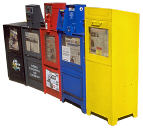News Snippets

October 2006 News
- Does Vista still contain benefits?
- Making the web easier
- Could virtualisation be the death of appliances?
Does Vista still contain benefits?
Once upon a time Microsoft announced a new operating system with a long list of really good features. After a while the list was reviewed and things got dropped. The new operating system still looked good so plans gained momentum. A little later the list was reviewed again and more things were dropped. The momentum had really gathered and the ball was really rolling and even delays could not stop the pace. Another review of the list and more things were dropped the latest being WinFS.
What is left?
You still need a new PC although to get real benefits it should be big. You still need it to exploit the new Office suite (which is also incidentally having list reviews and delays). It has a really good user experience especially for games with fantastic 3D graphics (not really useful with a SAP interface or running a browser).
For corporates the decision will be difficult although it will probably get caught up in the technology refresh cycles and the benefits case will be lost in history.
In Edinburgh in Summer the semantic web came closer to providing the benefits that have been talked about, presented and hyped for several years. At a W3C conference Berners-Lee and others said that the necessary components were now available to launch the development of semantic languages to exploit the web.
It will probably start with data mining by integrating databases and in the intranet environment using RDF (Resource Description Framework), OWL (Web Ontology Language) and the query language Sparql.
Could virtualisation be the death of appliances?
Virtual appliances have a number of advantages over traditional appliances: cabling, power consumption, heat generation, real estate and management. The list gets longer every week with the list of traditional appliance advantages getting shorter with the only big one left being risk. Virtual appliances suffer from the aggregation risk - many things on a single platform. A traditional appliance can be physically swapped out, introduced or removed with relative ease. They are relatively cheap and have commodity characteristics and have few dependencies. A virtual appliance has a lower TCO but has greater dependencies on other components.
Virtual appliances will kill the traditional appliances in large centralised environments but traditional appliances will still have a place in the remote small sites that have traditional support requirements.
Snippets
- SAP pushes service-oriented architecture through project Muse. The objective is to support business-level building blocks as productised enterprise services as web services.
- HP consolidates 85 global datacentres into six US-based facilities in Atlanta, Houston and Austin.
- The use of BitTorrent by Red Hat and SUSE to distribute Linux installation CD-Roms could bring it into the mainstream. The advantages are fragment management, clever error detection and platform support due to code portability of Python.
- Microsoft finally abandon WinFS as part of the Vista platform. It will be introduced in future releases of SQL-Server and ActiveX Data Objects (ADO).
- The US is to ease Sarbanes-Oxley (SOX) rules for foreign companies listing for the first time in the US. This is in response to the drop in companies wanting to float due to the compliance rules.
- IBM acquire MRO Software to extend the Tivoli Asset Management offering into non-IT assets. Interestingly this could cause some application partners notably SAP to move into the IT assets space.
This document maintained by dwb@dwb.co.uk. -------- Material Copyright © 1999-2006 dWb
